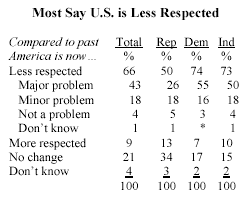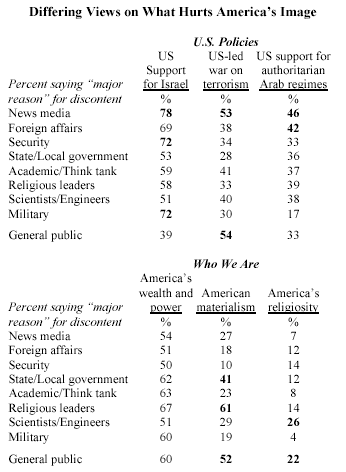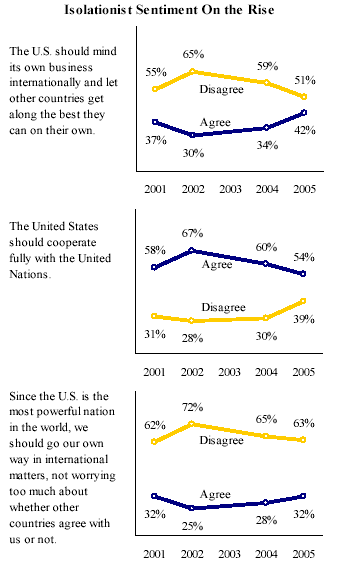
As dissatisfied as Americans are with things at home, they hold an even more negative opinion of the state of the world. In early October, Pew polling found just 29% of Americans satisfied with the way things are going in their country today, while 65% said they were dissatisfied — the most negative national assessment in nearly ten years. Public views of global conditions are typically more negative than opinions of the state of the nation; even so, just 16% say they are satisfied with the way things are going in the world, down from 21% in July 2004.
There is an element of partisanship in these numbers, as is the case with evaluations of national conditions. By an 86% to 9% margin, Democrats say they are dissatisfied with global conditions, and independents largely agree (80% dissatisfied, 13% satisfied). Among Republicans, 29% say they are satisfied with the way things are going in the world these days, while 64% are dissatisfied.
Terrorism, Iraq Top Problems

Opinion leaders and the public largely agree that terrorism and the situation in Iraq are the biggest international problems confronting the nation. When asked to describe the country’s biggest international problem in their own words, these topics were mentioned most frequently across all groups. Military and media opinion leaders, along with mayors and governors, were most likely to register concern about terrorism and global violence. Religious leaders, security experts, scientists and engineers and the general public more frequently cited Iraq as the nation’s greatest international concern.
Many influentials also identified America’s image in the world and the overall impression that America has lost credibility and respect as the greatest problems facing the nation. As one foreign affairs specialist put it, America has suffered “a loss of international confidence and respect due to the administration ramming a series of ill-considered political, economic and security policies.” A media executive described the problem in similar terms, saying America has “a lack of credibility as a fair and just world leader.” While common among many influential groups, these kinds of concerns were raised by fewer than one-in-twenty Americans generally.

With Iraq and terrorism topping the list, concerns about trade and America’s economic interests, which were mentioned frequently in previous rounds of this survey, have virtually disappeared from the list. Only a handful of military and religious leaders, governors and mayors cited these as the country’s most important international concerns. Among the general public, the proportion referring to trade deficits, jobs moving overseas or other international economic concerns fell from 22% in 1993 to 16% in 1997, 9% in 2001 and just 6% today.
Public Sees U.S. Image Declining

Americans also take the view that the U.S. has lost respect in the world recently. As was the case in July 2004, two-thirds say the U.S. is less respected by other countries than in the past, while just 9% say more respected and 21% say things haven’t changed. Even among Republicans, half say America is less respected than in the past, a view held by nearly three-quarters of both Democrats and independents.
Most who say the nation has lost respect believe that this is an important concern. Roughly four-in-ten Americans (43%) — two-thirds of those who say America is less respected — say this is a major problem for the country. There are larger partisan differences over whether decreasing international respect for the U.S. represents a major problem; roughly half of Democrats (55%) and independents (50%) view this as a major problem compared with about a quarter of Republicans (26%).
War Seen as Fueling Anti-U.S. Sentiment
Opinion leaders and the public overwhelmingly point to the war in Iraq as a major reason for discontent with the U.S. around the world. This belief is nearly unanimous among foreign affairs experts (95%), security specialists (93%), and scientists and engineers (90%). Even military leaders, who express relatively positive opinions of the military operation in Iraq, generally believe the war is a major factor in global unhappiness with the U.S.

The general public concurs in this view. Eight-in-ten Democrats point to the war as a major reason for international discontent with the U.S., and large majorities of independents (70%) and Republicans (64%) agree.
America’s wealth and power also are regarded as primary reasons for dissatisfaction with the U.S. But the public and opinion leaders differ when it comes to the effects of U.S. policies on the Middle East and terrorism on the nation’s image.
Majorities in every influential group say that U.S. support for Israel is a major cause of global discontent with the U.S. This belief is especially widespread among members of the news media (78%), security experts (72%), military leaders (72%) and foreign affairs specialists (69%).
But just 39% of the public sees U.S. support for Israel as a major reason that America’s global image suffers — most (52%) say it is only a minor reason, or not much of a reason. White evangelical Protestants, who are among Israel’s strongest supporters, are more likely than members of other religious groups to view U.S. backing for Israel as major cause of international discontent with America. Half of evangelicals say support for Israel is a major factor for unhappiness with the U.S.; that compares with a third of non-evangelical Protestants (33%) and seculars (34%), and 36% of white Catholics.

For the public, the U.S.-led war on terrorism is a leading factor in global unhappiness with America (54%). But a majority in just one of the eight elite groups shares this opinion (news media 53%). Similarly, American materialism is a bigger factor for the public than for most groups of opinion leaders among causes of international discontent with the U.S.
Notably, U.S. support for authoritarian Arab governments is seen as a relatively minor cause of global discontent with the U.S. Military leaders, in particular, see U.S. backing for such governments as a fairly insignificant factor; just 17% say it is a major reason for discontent with America.
America’s Leadership Role
The American public traditionally has favored a far less expansive role for the United States in world affairs than have opinion leaders. In 1993, 1997 and 2001, sizable majorities in almost all influential groups said the U.S. should play the most assertive leadership role in the world, if not act as the single world leader, while fewer than four-in-ten Americans nationwide agreed.
But the gap between opinion leaders and the general public has narrowed significantly, as a declining number of influentials favor an assertive U.S. leadership role in the world. This shift in opinion can be seen across almost all groups. For example, barely half of security experts today say the U.S. should take a preeminent role in world affairs, compared with roughly three-quarters in previous surveys. State and local government officials and news media leaders are also substantially more likely to say that America should be no more assertive in world affairs than other leading nations. In fact, a majority of both religious leaders and scientists and engineers today say the U.S. should not take a particularly active leadership role in the world.
By comparison, the public’s long-term views on U.S. leadership have remained fairly steady, with an important exception. Following the 9/11 terror attacks, the share of Americans who supported a strong leadership role spiked upward, but has since declined. Today 12% of Americans say the U.S. should be the single world leader, while 25% say it should play a shared leadership role but be the most assertive of leading nations. A 47% plurality believes the U.S. should be no more or less assertive than other nations, while 10% think we shouldn’t play any leadership role at all.
Public Less Internationalist

Following a spike in internationalist sentiment in the wake of the 9/11 attacks, public skepticism about becoming too involved with world affairs has returned. The percentage of Americans who say the U.S. should “mind its own business internationally” has risen to 42%; just 30% expressed this opinion in December of 2002.
Support for full cooperation with the United Nations stands at 54%, down from 67% three years ago and a low point since 1976 (46%). By about two-to-one (63%-32%), the public rejects the idea of America going its own way and “not worrying too much about whether other countries agree with us or not.” But in 2002, Americans rejected this sentiment by nearly three-to-one (72% disagree/25% agree).
There are partisan divides on these questions, though each has its own dynamic. For example, Democrats are twice as likely as Republicans (55% vs. 27%) to say the U.S. should “mind its own business internationally” and not worry about other countries, and Democrats also are more apt to say we should “concentrate more on our own national problems.” But Republicans clearly take a more unilateralist position on other questions. When it comes to the U.N., Republicans are twice as likely as Democrats (56% vs. 24%) to say the U.S. does not need to cooperate fully with the international body.
Bush’s Foreign Policy Leadership

When asked to name the best things about President Bush’s foreign policy, opinion leaders cited a diverse array of decisions and leadership strengths. Nearly one-in-five news media leaders cited Afghanistan as the greatest success of the administration, and the same proportion of religious leaders referred to advances in the Israeli-Palestinian peace process.
Others referred to Bush’s leadership style as his greatest asset. Many governors and mayors applaud the administration’s efforts to make America’s foreign policy clear and straightforward, and many military leaders cite the president’s decisiveness as the best aspect of his foreign policy.
But a sizable minority of opinion leaders could think of nothing to say when asked what has been best about Bush’s handling of foreign policy.
Fully 37% of scientists and engineers volunteered that they had “nothing” good to say, or offered a sarcastic response such as “Well, he hasn’t bombed Antarctica yet.”
Roughly half of news media, foreign affairs, security and academic leaders, along with scientists and engineers, cite Iraq as the worst aspect of Bush’s foreign policy so far. But a number of other concerns were raised consistently across all groups.

Between 17% and 34% in every group cited weakened relations with allies as Bush’s greatest failure, and between 9% and 18% referred to what they see as an “arrogant” foreign policy stance. The administration is also criticized for being indecisive and unilateral.
The Public’s Views of Bush’s Foreign Policy
Public views of Bush’s foreign policy generally mirror the views of opinion leaders. While Bush’s overall job approval rating stood at 40% in October (Oct. 12-24), a narrow majority (52%) says he is doing a good job handling terrorist threats.
But Bush gets negative marks for his handling of other foreign policy issues. About half (51%) disapprove of Bush’s handling of the nation’s overall foreign policy, and 57% disapprove of his handling of Iraq.

Public opinion is decidedly negative over Bush’s immigration policy. Just 24% say they approve of his job performance on immigration, while 54% disapprove (22% volunteer no opinion). Even Republicans, on balance, disapprove of Bush’s handling of immigration; 36% approve of the job he is doing in this area, while 43% disapprove. Seven-in-ten Democrats (72%) and half about half of independents (52%) also give Bush negative ratings on immigration.
This dissatisfaction is politically relevant because the general public places a far higher priority on issues of immigration than do opinion leaders. Fully 51% of Americans say reducing illegal immigration should be a top foreign policy priority for the nation.




